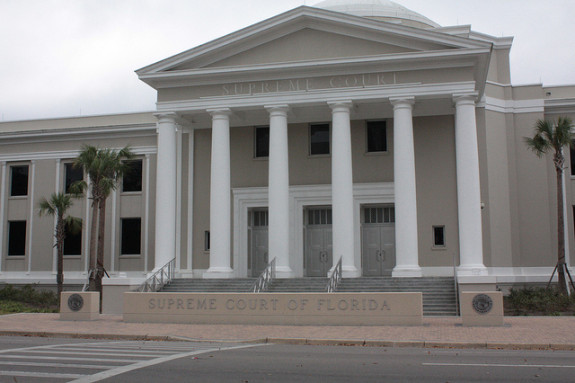
The Florida Supreme Court ruled a GOP political consulting group should release documents related to the state’s 2012 redisticting effort. (Photo via quite peculiar/Flickr)
By Ashley Lopez
Florida Center for Investigative Reporting
A legal challenge over whether documents related to the Florida Legislature’s 2012 effort to redraw the state’s congressional districts should be made public has been settled. In a unanimous vote, the Florida Supreme Court ruled that a political consulting group must make public its 538 pages of documents relating to the effort.
The Florida League of Women Voters and a group of individuals filed a lawsuit against state lawmakers in 2012. They alleged the Florida Legislature violated laws enshrined in the 2010 Fair Districts Amendments, which mandates the state draw districts that don’t favor one party over the other.
Months ago, a judge ruled that the League and others were right. However, the issue of whether documents belonging to Gainesville-based Data Targeting should be used in the trial was not settled. At issue were the 538 confidential pages — including emails, maps and memos — related to the redistricting effort. GOP political consultants had maintained that the memos are trade secrets.
The First District Court of Appeal ruled this past summer that the documents should not be released, but the court later issued an opinion referring the matter to the Florida Supreme Court.
Because the issue had not been settled, when the documents were discussed in court the courtroom was sealed off from the public and the media was asked to leave.
However, the matter has now been settled by the state’s highest court.
According to The Herald Tribune:
Circuit Judge Terry Lewis found the original congressional districts violated the state constitutional prohibition against drawing [district] lines to favor a political party. He ordered the congressional districts redrawn, which the Legislature did earlier this year in a special session and Lewis upheld those revised districts.
As side issue to that case, Pat Bainter, a Gainesville-based Republican consultant involved in behind-the-scenes discussions of the redistricting plans, argued that documents from his firm, Data Targeting Inc., should not be made public because it would violate trade secrets and his First Amendment right as a citizen to petition lawmakers.
The Supreme Court rejected that argument, noting that Bainter did not raise those objections until months after the court had ordered the consultant to produce the documents that included emails and maps related to the redistricting process.
“We simply do not countenance and will not tolerate actions during litigation that are not forthright and that are designed to delay and obfuscate the discovery process,” Justice Barbara Pariente said in the majority opinion.
“Not only is there no legally valid reason at this time for allowing these documents or the testimony admitted at trial under seal to be hidden from public view, but this court is committed to the principle that ‘all trials, civil and criminal, are public events and there is a strong presumption of public access to these proceedings and their records,’” Pariente said, citing a 1988 court ruling involving the divorce records of a powerful state lawmaker.
News organizations — including The Miami Herald-– filed amicus briefs with the court urging them to rule for disclosure.
